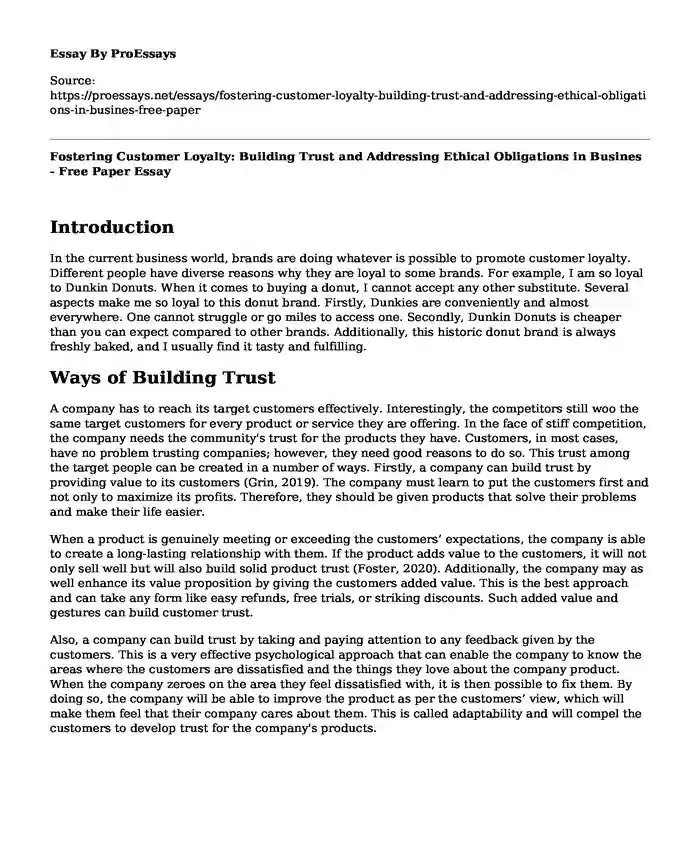Introduction
In the current business world, brands are doing whatever is possible to promote customer loyalty. Different people have diverse reasons why they are loyal to some brands. For example, I am so loyal to Dunkin Donuts. When it comes to buying a donut, I cannot accept any other substitute. Several aspects make me so loyal to this donut brand. Firstly, Dunkies are conveniently and almost everywhere. One cannot struggle or go miles to access one. Secondly, Dunkin Donuts is cheaper than you can expect compared to other brands. Additionally, this historic donut brand is always freshly baked, and I usually find it tasty and fulfilling.
Ways of Building Trust
A company has to reach its target customers effectively. Interestingly, the competitors still woo the same target customers for every product or service they are offering. In the face of stiff competition, the company needs the community's trust for the products they have. Customers, in most cases, have no problem trusting companies; however, they need good reasons to do so. This trust among the target people can be created in a number of ways. Firstly, a company can build trust by providing value to its customers (Grin, 2019). The company must learn to put the customers first and not only to maximize its profits. Therefore, they should be given products that solve their problems and make their life easier.
When a product is genuinely meeting or exceeding the customers’ expectations, the company is able to create a long-lasting relationship with them. If the product adds value to the customers, it will not only sell well but will also build solid product trust (Foster, 2020). Additionally, the company may as well enhance its value proposition by giving the customers added value. This is the best approach and can take any form like easy refunds, free trials, or striking discounts. Such added value and gestures can build customer trust.
Also, a company can build trust by taking and paying attention to any feedback given by the customers. This is a very effective psychological approach that can enable the company to know the areas where the customers are dissatisfied and the things they love about the company product. When the company zeroes on the area they feel dissatisfied with, it is then possible to fix them. By doing so, the company will be able to improve the product as per the customers’ view, which will make them feel that their company cares about them. This is called adaptability and will compel the customers to develop trust for the company's products.
Ethical Issues and Obligations After Building Trust
When a company succeeds in building customers’ trust, there are some associated issues can emerge. The company has to be extra cautious to retain the image and trust that it has already attained. Firstly, the company is obliged to maintain and enhance customer satisfaction. Since now the customers are loyal to the brand, possibilities are that any complaint they might raise is genuine. Thus, when they raise any alarm, the company must reply with the prompt. Secondly, the customer has to protect customer data or information. If a company leaks any information regarding its customers, it may destroy the already earned trust.
It is okay for customers to trust companies that satisfy or exceed their expectations. If the company has succeeded in making genuine and quality products, it is reasonable for the customer to build trust in such a brand to develop a consumer-brand relationship. After all, trusting each other is the best element in the world of business. However, there are some customers who cannot be loyal to a company simply because they do not care. While some customers are loyal to a brand because of preference and quality, some could be just looking for the most economical products or even the fastest service. For loyal customers, they are ready to stick to one company since they are clear on what to expect every time (Greider, 2014).
References
Foster, M. (2020). What makes customers loyal to brands? Convince & Convert. https://www.convinceandconvert.com/online-customer-experience/what-makes-customers-loyal/
Greider, T. (2014). What makes you loyal to a brand? Business to Community. https://www.business2community.com/loyalty-marketing/makes-loyal-brand-0826022
Grin. (2019). The psychology of brand trust to enhance your business. Grin Technologies. https://grin.co/blog/psychology-of-brand-trust/
Cite this page
Fostering Customer Loyalty: Building Trust and Addressing Ethical Obligations in Busines - Free Paper. (2023, Dec 16). Retrieved from https://proessays.net/essays/fostering-customer-loyalty-building-trust-and-addressing-ethical-obligations-in-busines-free-paper
If you are the original author of this essay and no longer wish to have it published on the ProEssays website, please click below to request its removal:
- Computer Ethics in the Workplace Essay
- Evaluating an Integrated Marketing Communication Program of Walmart
- Meditations in Philosophy of Descartes Essay Example
- Amazon Facing Violations Over Child Labor in Foxconn Factory - Essay Sample
- The Debate on Happiness and Freedom: Which is More Important? - Essay Sample
- International Business: Understanding Motivational Leadership in Foreign Countries - Essay Sample
- Essay Example on Amazon's Expansion: Government Regulations & Challenges







